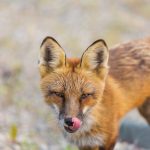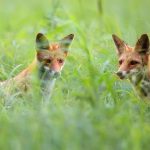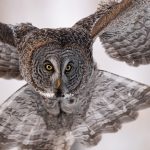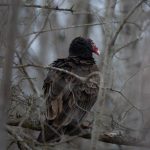Hawks will eat foxes as carrion – but they rarely ever actively hunt adult foxes. Hawks generally prefer smaller prey – but may take fox cubs occasionally.
How Often Do Hawks Eat Foxes?
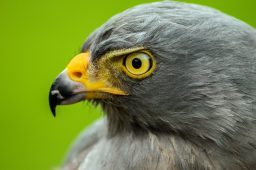
Hawks come in a wide range of sizes including several with a wingspan over a meter and a half wide – so they could very well take some large prey. However, in reality hawks generally prefer to take smaller prey – like insects, small birds and voles.
Even the largest hawk in the world – the Ferruginous Hawk – topping out at 5lbs in weight and around 50-70cm tall – mainly eats only small mammals. This huge hawk – often mistaken for an eagle – feasts mainly on ground squirrels, pocket gophers, and voles (to name a few), making up around 80% or more of their diet. Therefore, the likelihood of a hawk killing and eating live foxes is very slim – seeing as they certainly couldn’t eat a whole one!
Also Read Our Other Article: Do Hawks Attack Cats And Dogs?
They will however eat foxes if they find them already dead or partially eaten. Hawks are very good at taking advantage of carrion – particularly roadkill. They are often seen eating prey much larger than they could hunt or catch – that they have already found dead (or dying). Some hawks have even been found with the bones of horses and deer in their nests having most likely flown off with a few talon-fulls of flesh from an already dead animal to feed their growing chicks.
What Do Hawks Usually Eat?
Hawks have a very varied diet with some hawks having over 500 species regularly on the menu. Many are opportunists – eating any available small mammals, birds, or insects (depending on the size of the hawk) and others are very good at feeding in their chosen niche. In these cases, most of their diet comprises that same type of prey.
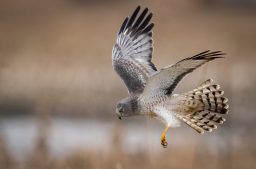
Larger hawks can catch larger prey of course- and defend it better – so often take squirrels, magpies, and prairie dogs for example, whereas smaller hawks – like the aptly-named South American Tiny Hawk (around 3oz in weight and less than 10 inches long) – catch teeny birds such as hummingbirds in flight or take big insects and beetles off the ground.
Many hawks love to run on the ground to catch their prey, others can catch in dense woodland in flight, while others sit and wait in a tree and just drop down onto the unsuspecting animal. Most, however, hunt during the day and so tend to favor diurnal species – those awake during normal sunlight hours. Hawks also semi-migrate for food as lack of insects and hibernating rodents can cause local food shortages in the colder months.
Do Hawks Eat Fish?
There are hardly any hawks that will eat fish – and none who can actively catch them. But there is a well-known, but rare, large raptor who does.
The Osprey lives almost entirely on fish – and is often called the ‘sea-hawk’ or ‘fish hawk’ although it isn’t actually a hawk at all. It belongs to a separate group of raptors to hawks and eagles – however, its appearance is very similar. As a result – they are often assumed to be closely related birds and so acquired their common names by appearance and habit only.
Ospreys however are a very unique bird and occupy their very own family group – just outside of the main eagle/hawk group. They have some unusual adaptations – including having a reversible outer toe to help better keep hold of slippery fish!
Do Rhinos Eat Meat Like Hawks? ????
The question of rhinos’ diet: meat consumption answered. Rhinos are herbivores, unlike hawks. They primarily feed on grass, leaves, fruits, and even bark. Meat is not a regular part of their diet, as their digestive system is not adapted for processing it. Rhinos are built to thrive on a plant-based diet.
Will Hawks Attack Livestock?
It is very unlikely that a hawk will attack livestock. These animals are not only much larger than the hawks normal prey choices – but their habitat is usually very different.
However, as with all raptors – they may well attack anything that comes too close to an active nest which they see as a threat. Some hawks – like the voracious Northern Goshawk – are incredibly defensive over their nest sites. If livestock are grazing in nest-territory during the spring (peak nesting time) then there could well be the odd livestock attack.
It is also possible – in bad food years – that there could be attacks on newborn lambs or kids. Spring lambing of course, coincides with the extra feeding demands on the hawk parents for raising chicks. Luckily for lambs though, male hawks (who do most of the hunting at this time) are always considerably smaller than the females – so are much less likely to take a lamb or other small livestock.


